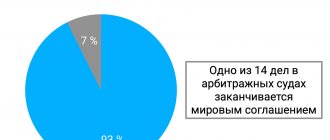Competence of arbitration
To obtain error-free results for calculating the state duty, you must enter the correct initial data in the calculator field.
To determine the correctness of this data, you first need to understand the competence of arbitration courts. In any of the claims subject to arbitration, we are talking, first of all, about disputes between legal entities. In addition, the arbitration court has jurisdiction over:
- claims related to bankruptcy of individuals;
- claims and statements containing demands for the repeal or modification of regulations in the field of business activity;
- claims arising from administrative law (not to be confused with the Code of Administrative Offences) concerning demands for the cancellation of decisions of government agencies;
- applications for cancellation of arbitration decisions.
The fee awarded by the court
There are many precedents when a person receives a decree from the bailiffs, demanding the payment of a certain state fee assigned by the judicial authorities. Often, the recipient of such a notice does not even know where such a claim originates, so he has understandable questions.
In most situations of this kind, the point is that in relation to the citizen who received such a notification, legal proceedings were once initiated in which he acted as a defendant. According to the rules, if, as a result of the proceedings, a decision is made in favor of the plaintiff, then the second party is awarded not only to fulfill his demands, but also to pay the fee paid by the petitioner.
Moreover, the practice is such that a person may not even realize that a trial has been initiated and carried out against him. This is possible if we are talking about writ proceedings. Most often, such hearings take place without a defendant. But in general, precedents occur if there is arrears on utilities, loans or taxes.
Therefore, as for what the state duty awarded by the court is, 200 rubles is the same amount for issuing a court order, paid by the plaintiff when going to court. And if the request is granted, then the amount of the fee is collected from the second party. In other words, from the debtor.
Amounts of state duty on claims
For property disputes, the amount of the state duty is determined by the size of the declared material claims. In order for the calculator to display the correct result, you only need to tell it the amount of the claim. All interest rates necessary for correct calculation are entered into the calculator algorithms.
For non-property disputes, the legislator has established fixed amounts of state duty, so the calculator will need not the amount of the claim, but its type.
The categories of non-property disputes include:
- claims for contractual disputes;
- claims arising from administrative law, as well as statements arising from disputes with authorities;
- claims arising from copyright;
- bankruptcy claims;
- applications for the repeal of by-laws adopted by authorities and officials;
- statements concerning the establishment of legal facts.
What is the price
Depending on the price of the claim, the amount that the plaintiff pays when filing a property application can range from 2,000 to 200,000 rubles. The amount of the state duty is also influenced by other factors, for example, who is the plaintiff, on what issue he is going to court. Our state fee calculator for the arbitration court will help you roughly estimate the costs, which takes into account all possible circumstances and facts.
If we turn to the Tax Code of the Russian Federation, where all tariffs are indicated, it becomes obvious that the duty, depending on the price of the claim, changes as follows:
- up to 100,000 - 4% of the claim price, but not less than 2,000 rubles;
- from 100,001 to 200,000 - 4,000 rubles. plus 3% of the amount exceeding 100,000;
- from 200,001 to 1,000,000 - 7,000 rubles. plus 2% of the amount exceeding 200,000;
- from 1,000,001 to 20 rubles. plus 1% of the amount exceeding 1,000,000;
- over 20 rub. plus 0.5% of the amount exceeding 2,000,000, but not more than 200,000 rubles.
If a dispute about concluding, amending or terminating a contract or a dispute about invalidating a transaction is being considered, the fee is 6,000 rubles.
Filing an application to declare a normative legal act invalid, to declare a decision, action or inaction of government agencies or officials illegal, costs 300 rubles. for individuals and 3000 for organizations.
When filing other claims of a non-property nature, you will have to pay a fee of 6,000 rubles; for bankruptcy applications, citizens pay 300, and organizations - 6,000 rubles.
Other types of state fees for arbitration cases
In addition to statements of claim, state fees are subject to payment:
- applications for a court order in cases previously considered by arbitration;
- additional statements made during the consideration of the case;
- applications for seizure of property as an interim measure;
- appealing decisions of arbitration courts;
- appealing the decision of the arbitration court to a higher authority;
- application for review of cases based on newly discovered circumstances, and others.
Payment Features
Payment of the state fee involves some tricks that the plaintiff should familiarize himself with before sending the statement of claim. For example, if the content of the claim concerns issues of both property and non-property spheres, then the applicant will have to pay a double fee:
- firstly, the plaintiff will need to pay a state fee, which is intended for non-property claims;
- secondly, the plaintiff will need to spend on state fees focused on property claims.
The calculation of each of the state fees is made on the basis of generally accepted rules, which also applies to counterclaims that come from the defendant.
Property claims can be either with or without an appraisal
Change of claims
Sometimes during the trial, the plaintiff decides to add new items to the list of claims. This increase in the initial list also implies an increase in the state duty, which entails the need to pay additionally the uncovered part of the amount. The opposite rule is also true - if the plaintiff for some reason refuses some of the claims, he has every right to demand the return of part of the funds.
Reducing or increasing claims affects the cost of state duty
Common property
Another difficult issue is related to the division of property that is in common ownership. Filing a claim of appropriate content involves dividing property into shares in court. Such circumstances suggest their own logic for paying state duty:
- if disputes regarding the establishment of ownership rights to the plaintiff’s property have never previously involved judicial intervention, the amount of the state duty is calculated based on the size of the property that appears in the statement of claim;
- if the courts have already participated in making the appropriate decision recognizing the plaintiff as the owner of the property (more precisely, the share indicated in the claim), then the amount of the state duty becomes a fixed amount equal to 200 rubles.
The amount of the state duty when considering issues related to the division of property depends on whether this case has been considered previously
Divorce
Often, divorcing spouses file two lawsuits at once:
- claim for divorce;
- claim for division of jointly acquired property.
In such circumstances, spouses are also forced to pay double state duty - for claims aimed at divorce and for claims affecting property issues.
In the event of a divorce, spouses pay double the state fee, since the court considers two cases at once
What to do if you receive a notification from the bailiffs
When a notice arrives with a requirement to repay the state duty awarded by the court, first of all, it is worth thinking and remembering whether there are any debts to any government or financial authorities.
Because if there are any, then the fee will most likely have to be repaid. However, it is important to clarify that in this case, in addition to the penalty order, the citizen must also be sent a copy of the issued order. It is recommended to follow this algorithm:
- Call or appear in person at the bailiff service. Here you should ask questions and request a writ of execution. The document must indicate on what basis the duty is collected, and who exactly initiated the writ proceedings.
- Find out if there is a debt. If there really is one, then you should immediately pay it off. Otherwise, it is possible that additional fines and penalties will be assessed; in short, non-payment will lead to financial losses.
- List the awarded amount of state duty. Moreover, it is best to carry out the operation within the time frame indicated in the notice. Otherwise, an enforcement fee will be added to the amount of the monetary penalty.
In general, errors in the system occur frequently, so if the situation occurs, do not delay. It’s better to immediately contact the bailiffs and find out what’s wrong. Especially if the recipient of the duty collection notice has no idea what it is about. It is possible that a particular person is generally not relevant to the matter. For example, he may have a namesake. In a word, it’s definitely worth understanding.
Actions to take when receiving a notification
Along with the notification, the competent bailiff sends the debtor a copy of the court order. The contents of the document indicate within the framework of which enforcement proceedings the money is collected. This will allow the citizen to become familiar with the legality of the grounds for claiming funds. The further procedure will be as follows:
- Personal appeal to the FSSP. This is necessary in order to confirm that the writ of execution was sent by the FSSP service and is not the result of the work of fraudsters. This can be done by calling your office phone. An employee of the bailiff service informs the conditions under which the need to pay the state fee arises.
- Clarification of information about the presence of related financial obligations. This applies to fines owed to banks (mortgage lending, consumer loans), individuals (alimony), and government organizations (unpaid fines). If there are such obligations, the main body of the debt, additional fines and penalties must be repaid in a timely manner.
- Depositing funds towards state duty. The letter from the FSSP indicates the date by which the money must be deposited. If deadlines are violated, an additional penalty will be charged.
In practice, situations occur when FSSP notices are sent to citizens by mistake. This may be due to the same personal information or lack of information about a previously made payment. Therefore, you need to figure it out before paying.







